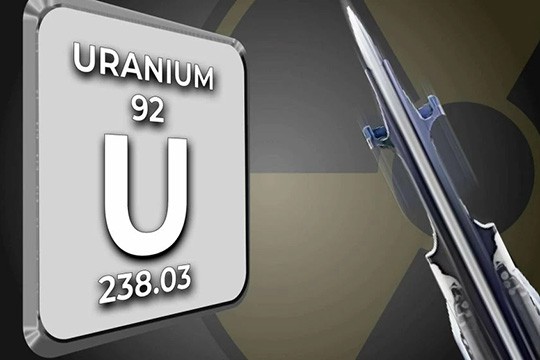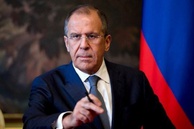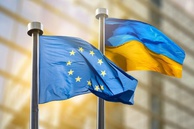In the Ukrainian conflict, any type of weaponry transcends its capabilities and breaks into the information space even before it reaches the battlefield, already participating in the war, striking on the diplomatic, reputational and psychological fronts. This is exactly the case with depleted uranium shells, which Britain’s Deputy Minister of Defense Annabel Goldie said London would supply to Ukraine: “Along with providing a squadron of Challenger 2 battle tanks to Ukraine, we will supply ammunition, including armor-piercing shells that contain depleted uranium,” she announced. [i] Even if we assume that this pro-Ukrainian announcement made by the Deputy Minister came just on the spur of the moment, the result is the same – an intention to provide Ukraine with new weapons, to raise the stakes in the confrontation, which means an attempt at a further escalation of the conflict and adding a nuclear (radiation) factor into it.
Vasily Kashin, director of the Center for Comprehensive European and International Studies at the National Research University Higher School of Economics, noted, that “comparing the use of depleted uranium shells with a dirty bomb is not entirely correct, since they have a lower radiation background. At the same time, from a legal standpoint, they can be viewed as ‘a kind of a by-product of radioactive weapons.’”[ii]
Meanwhile, in nationally televised remarks, Russian MP, General Andrey Gurulyov, said that "artillery shells containing depleted uranium are nuclear weapons, just like any other nuclear weapon.”
In a word, a weapon with a "low radiation background" is still a nuclear weapon, as was amply proved by the effects of the use of depleted uranium shells in Iraq and Yugoslavia.
Russian Defense Minister Sergey Shoigu warned against such a move, saying that the UK's stated intention to supply depleted uranium rounds leaves “fewer steps left on the way to a nuclear confrontation." Foreign Minister Sergey Lavrov reiterated Moscow’s clear position regarding this issue. "A possible supply of depleted uranium shells by Britain to Kyiv is a step towards a significant escalation of the situation," he warned. [iii]
Proud Britons, through their Foreign Office, gave a simple answer: “Supplying Ukraine with ammunition containing depleted uranium is not a nuclear escalation.” [iv] This demonstrates the British, and generally Anglo-Saxon, attitude towards the rest of the world, which they consider ignorant and simply bound to believe anything they are told.
When asked about the supply by Britain of depleted uranium rounds to Kiev, NATO Secretary General Jens Stoltenberg claimed that in their support for Ukraine members of the alliance just stick to international law.
“NATO members follow international rules and law in everything they do in support of Ukraine.” [v] He sees nothing wrong in supplying depleted uranium rounds. The US position is even more cynical, with White House spokesperson John Kirby saying that although the United States would not send depleted uranium ammunition to Ukraine, it is positive that such weapons pose no radioactive threat, as they are “conventional weapons that have been used for decades.”
The sheer fact that the US says it does not plan to follow the UK in handing over depleted uranium shells to Ukraine [vi] is nothing but cynical rhetoric. Moreover, the Bradley armored fighting vehicles designed for the use of such ammunition are supplied to Ukraine by none other than the Americans.
General Gurulyov regards the intention to supply rounds with depleted uranium as an act of malicious desperation: “All NATO tanks have a 120-mm cannon; they will try to deliver sub-caliber ammunition with depleted uranium. What for? Only to contaminate Ukrainian territory. It is not possible to find any mass application for such weapons today, when they hit concrete, they turn into dust that infects the area and will harm the people who will later live in this area. NATO realizes that this territory will no longer be under their control.” [vii]
Here are more details about depleted uranium shells: “Depleted uranium is a by-product of the process of creating rarer enriched uranium used in nuclear fuel and weapons. Although much less powerful than enriched uranium and unable to cause a nuclear reaction, depleted uranium is extremely dense - more dense than lead - a quality that makes it very attractive as a projectile. It’s so dense and has such a big momentum that it just keeps going through the armor heating it up to a degree that it fires up,” experts say. When it does, a depleted uranium shell essentially becomes “an exotic metal dart fired at an extremely high velocity."[viii]
For quite some time, the Zaporizhzhya NPP was a key nuclear factor in the Ukrainian crisis, but as soon as the issue of deplete uranium shells came up, the IAEA said it was taking the topic of creating a demilitarized zone around the Zaporizhzhya NPP off the agenda. [ix]
Commenting on this, Renat Karchaa, adviser to the head of the Rosenergoatom concern, said, “Thank God that the issue of demilitarization has finally been removed from the agenda. However, it was removed by the IAEA. We always trusted and continue to trust the wisdom of the head of this institute and its participants.” [x] He believes that the topic of demilitarization was imposed on Russia in order to weaken its positions, "which would inevitably lead to increased risks associated with nuclear security." Karchaa emphasized, however, that Russia has never refused to create a security zone around the Zaporizhzhya station.
The nuclear factor pertaining to the Zaporizhzhya NPP has a nuclear, military and a political component. A statement by [IAEA chief Rafael] Grossi is simply a recognition of the stupidity of the demands for the "demilitarization of the Zaporizhzhya nuclear power plant," which is located on Russian territory, is operated by Rosatom, a nuclear facility that Ukrainian saboteurs have tried and are trying to land on, and which comes under regular shelling by the Ukrainian armed forces. Therefore, Mr. Grossi’s words coming amid a stated British intention to supply depleted uranium weapons to Ukraine can be seen as a continuation of the game with the nuclear factor amid the Ukrainian crisis.
Depleted uranium shells are highly toxic and carcinogenic, but lower in radioactivity than a dirty bomb - these are the reasons for opening a new Overton window for Russia's adversaries. What the West essentially says is that there is nothing wrong about these shells because they are “not nuclear enough,” that they have already used them in the past, and they are okay, although Serbs get sick and die more often, but generally they are alive, aren’t they?
A recap: The West does not hide its intention to use radioactive weapons in Ukraine, despite the damage this will cause to Ukraine’s environment, its people and the military personnel, who will use these weapons.
This politically and environmentally dirty weapon has no chance of turning the tide of the conflict and playing any decisive role. Obviously, this weapon can only be fired by US Abrams, German Leopard 2 and British Challenger tanks, the number of which is limited. However, British shells will only fit British tanks and US ones – only the Bradley armored vehicles. This means the direct responsibility of each country supplying depleted uranium shells for the radioactive contamination of the territories of both Ukraine and Russia.
The West just couldn’t care less about Ukraine and its people; it is ready for an escalation, continues to carry out provocations, desperately looking for ways to resist Russia by military force in the Ukrainian conflict. However, for the Western political leadership and its proxies in the person of Volodymyr Zelensky Ukraine does not mean anything, otherwise they would never agree to supply depleted uranium shells, all the more so when warehouses containing such shells brought to Ukraine may come under fire, after which the West could talk at length about the “insignificance of radioactive contamination” and about “Russian aggression.”
As we well know from history, Washington will not stop at anything to achieve its goals, suffice it to mention the atomic bombing of Japan, napalm and Agent Orange used in Vietnam, as well as depleted uranium shells used in Iraq and Yugoslavia, and the consequences of all this that whole generations of people of those countries suffered for decades. Well, the British apparently feel too safe on their island across the Channel, just like the Americans do on the other side of the Atlantic…
The views of the author are his own and may differ from the position of the Editorial Board.
----------------------------------------------------------------------------
[i] https://www.rbc.ru/politics/21/03/2023/6419a5db9a794784da17bce2
[ii] https://www.rbc.ru/politics/21/03/2023/63d1ce359a794701cd885308
[iii] https://t.me/navideovidno/58940
[iv] https://ria.ru/20230322/uran-1859777255.html
[v] https://ria.ru/20230323/uran-1860199467.html
[vi] https://www.rbc.ru/politics/21/03/2023/6419f5b09a7947a98e783d27
[vii] https://t.me/agurulev/2831
[viii] https://t.me/skabeeva/16771
[ix] https://ria.ru/20230323/magate-1859928108.html
[x] https://www.interfax.ru/russia/892485
read more in our Telegram-channel https://t.me/The_International_Affairs

 12:06 27.03.2023 •
12:06 27.03.2023 •



























